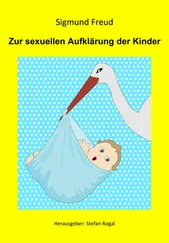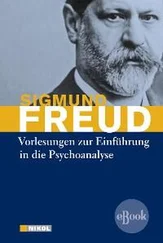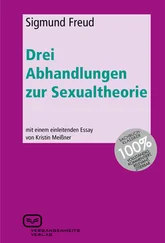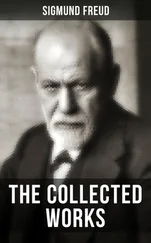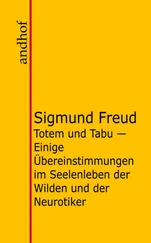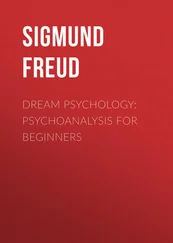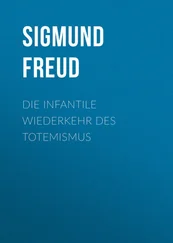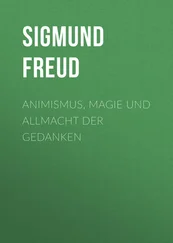Sigmund Freud - Dream Psychology
Здесь есть возможность читать онлайн «Sigmund Freud - Dream Psychology» весь текст электронной книги совершенно бесплатно (целиком полную версию без сокращений). В некоторых случаях можно слушать аудио, скачать через торрент в формате fb2 и присутствует краткое содержание. Год выпуска: 2014, Издательство: epubBooks Classics, Жанр: Психология, на английском языке. Описание произведения, (предисловие) а так же отзывы посетителей доступны на портале библиотеки ЛибКат.
- Название:Dream Psychology
- Автор:
- Издательство:epubBooks Classics
- Жанр:
- Год:2014
- ISBN:нет данных
- Рейтинг книги:3 / 5. Голосов: 1
-
Избранное:Добавить в избранное
- Отзывы:
-
Ваша оценка:
- 60
- 1
- 2
- 3
- 4
- 5
Dream Psychology: краткое содержание, описание и аннотация
Предлагаем к чтению аннотацию, описание, краткое содержание или предисловие (зависит от того, что написал сам автор книги «Dream Psychology»). Если вы не нашли необходимую информацию о книге — напишите в комментариях, мы постараемся отыскать её.
Dream Psychology — читать онлайн бесплатно полную книгу (весь текст) целиком
Ниже представлен текст книги, разбитый по страницам. Система сохранения места последней прочитанной страницы, позволяет с удобством читать онлайн бесплатно книгу «Dream Psychology», без необходимости каждый раз заново искать на чём Вы остановились. Поставьте закладку, и сможете в любой момент перейти на страницу, на которой закончили чтение.
Интервал:
Закладка:
Unless we enter into the part played by the affects in these processes, which can be done here only imperfectly, we cannot continue our discussion. Let us therefore advance the proposition that the reason why the suppression of the unconscious becomes absolutely necessary is because, if the discharge of presentation should be left to itself, it would develop an affect in the Unc. which originally bore the character of pleasure, but which, since the appearance of the repression, bears the character of pain. The aim, as well as the result, of the suppression is to stop the development of this pain. The suppression extends over the unconscious ideation, because the liberation of pain might emanate from the ideation. The foundation is here laid for a very definite assumption concerning the nature of the affective development. It is regarded as a motor or secondary activity, the key to the innervation of which is located in the presentations of the Unc. Through the domination of the Forec. these presentations become, as it were, throttled and inhibited at the exit of the emotion–developing impulses. The danger, which is due to the fact that the Forec. ceases to occupy the energy, therefore consists in the fact that the unconscious excitations liberate such an affect as—in consequence of the repression that has previously taken place—can only be perceived as pain or anxiety.
This danger is released through the full sway of the dream process. The determinations for its realization consist in the fact that repressions have taken place, and that the suppressed emotional wishes shall become sufficiently strong. They thus stand entirely without the psychological realm of the dream structure. Were it not for the fact that our subject is connected through just one factor, namely, the freeing of the Unc. during sleep, with the subject of the development of anxiety, I could dispense with discussion of the anxiety dream, and thus avoid all obscurities connected with it.
As I have often repeated, the theory of the anxiety belongs to the psychology of the neuroses. I would say that the anxiety in the dream is an anxiety problem and not a dream problem. We have nothing further to do with it after having once demonstrated its point of contact with the subject of the dream process. There is only one thing left for me to do. As I have asserted that the neurotic anxiety originates from sexual sources, I can subject anxiety dreams to analysis in order to demonstrate the sexual material in their dream thoughts.
For good reasons I refrain from citing here any of the numerous examples placed at my disposal by neurotic patients, but prefer to give anxiety dreams from young persons.
Personally, I have had no real anxiety dream for decades, but I recall one from my seventh or eighth year which I subjected to interpretation about thirty years later. The dream was very vivid, and showed me my beloved mother, with peculiarly calm sleeping countenance, carried into the room and laid on the bed by two (or three) persons with birds' beaks . I awoke crying and screaming, and disturbed my parents. The very tall figures—draped in a peculiar manner—with beaks, I had taken from the illustrations of Philippson's bible; I believe they represented deities with heads of sparrowhawks from an Egyptian tomb relief. The analysis also introduced the reminiscence of a naughty janitor's boy, who used to play with us children on the meadow in front of the house; I would add that his name was Philip. I feel that I first heard from this boy the vulgar word signifying sexual intercourse, which is replaced among the educated by the Latin "coitus," but to which the dream distinctly alludes by the selection of the birds' heads. I must have suspected the sexual significance of the word from the facial expression of my worldly–wise teacher. My mother's features in the dream were copied from the countenance of my grandfather, whom I had seen a few days before his death snoring in the state of coma. The interpretation of the secondary elaboration in the dream must therefore have been that my mother was dying; the tomb relief, too, agrees with this. In this anxiety I awoke, and could not calm myself until I had awakened my parents. I remember that I suddenly became calm on coming face to face with my mother, as if I needed the assurance that my mother was not dead. But this secondary interpretation of the dream had been effected only under the influence of the developed anxiety. I was not frightened because I dreamed that my mother was dying, but I interpreted the dream in this manner in the foreconscious elaboration because I was already under the domination of the anxiety. The latter, however, could be traced by means of the repression to an obscure obviously sexual desire, which had found its satisfying expression in the visual content of the dream.
A man twenty–seven years old who had been severely ill for a year had had many terrifying dreams between the ages of eleven and thirteen. He thought that a man with an ax was running after him; he wished to run, but felt paralyzed and could not move from the spot. This may be taken as a good example of a very common, and apparently sexually indifferent, anxiety dream. In the analysis the dreamer first thought of a story told him by his uncle, which chronologically was later than the dream, viz. that he was attacked at night by a suspicious–looking individual. This occurrence led him to believe that he himself might have already heard of a similar episode at the time of the dream. In connection with the ax he recalled that during that period of his life he once hurt his hand with an ax while chopping wood. This immediately led to his relations with his younger brother, whom he used to maltreat and knock down. In particular, he recalled an occasion when he struck his brother on the head with his boot until he bled, whereupon his mother remarked: "I fear he will kill him some day." While he was seemingly thinking of the subject of violence, a reminiscence from his ninth year suddenly occurred to him. His parents came home late and went to bed while he was feigning sleep. He soon heard panting and other noises that appeared strange to him, and he could also make out the position of his parents in bed. His further associations showed that he had established an analogy between this relation between his parents and his own relation toward his younger brother. He subsumed what occurred between his parents under the conception "violence and wrestling," and thus reached a sadistic conception of the coitus act, as often happens among children. The fact that he often noticed blood on his mother's bed corroborated his conception.
That the sexual intercourse of adults appears strange to children who observe it, and arouses fear in them, I dare say is a fact of daily experience. I have explained this fear by the fact that sexual excitement is not mastered by their understanding, and is probably also inacceptable to them because their parents are involved in it. For the same son this excitement is converted into fear. At a still earlier period of life sexual emotion directed toward the parent of opposite sex does not meet with repression but finds free expression, as we have seen before.
For the night terrors with hallucinations ( pavor nocturnus ) frequently found in children, I would unhesitatingly give the same explanation. Here, too, we are certainly dealing with the incomprehensible and rejected sexual feelings, which, if noted, would probably show a temporal periodicity, for an enhancement of the sexual libido may just as well be produced accidentally through emotional impressions as through the spontaneous and gradual processes of development.
I lack the necessary material to sustain these explanations from observation. On the other hand, the pediatrists seem to lack the point of view which alone makes comprehensible the whole series of phenomena, on the somatic as well as on the psychic side. To illustrate by a comical example how one wearing the blinders of medical mythology may miss the understanding of such cases I will relate a case which I found in a thesis on pavor nocturnus by Debacker , 1881. A thirteen–year–old boy of delicate health began to become anxious and dreamy; his sleep became restless, and about once a week it was interrupted by an acute attack of anxiety with hallucinations. The memory of these dreams was invariably very distinct. Thus, he related that the devil shouted at him: "Now we have you, now we have you," and this was followed by an odor of sulphur; the fire burned his skin. This dream aroused him, terror–stricken. He was unable to scream at first; then his voice returned, and he was heard to say distinctly: "No, no, not me; why, I have done nothing," or, "Please don't, I shall never do it again." Occasionally, also, he said: "Albert has not done that." Later he avoided undressing, because, as he said, the fire attacked him only when he was undressed. From amid these evil dreams, which menaced his health, he was sent into the country, where he recovered within a year and a half, but at the age of fifteen he once confessed: "Je n'osais pas l'avouer, mais j'éprouvais continuellement des picotements et des surexcitations aux parties ; à la fin, cela m'énervait tant que plusieurs fois, j'ai pensé me jeter par la fenêtre au dortoir."
Читать дальшеИнтервал:
Закладка:
Похожие книги на «Dream Psychology»
Представляем Вашему вниманию похожие книги на «Dream Psychology» списком для выбора. Мы отобрали схожую по названию и смыслу литературу в надежде предоставить читателям больше вариантов отыскать новые, интересные, ещё непрочитанные произведения.
Обсуждение, отзывы о книге «Dream Psychology» и просто собственные мнения читателей. Оставьте ваши комментарии, напишите, что Вы думаете о произведении, его смысле или главных героях. Укажите что конкретно понравилось, а что нет, и почему Вы так считаете.


